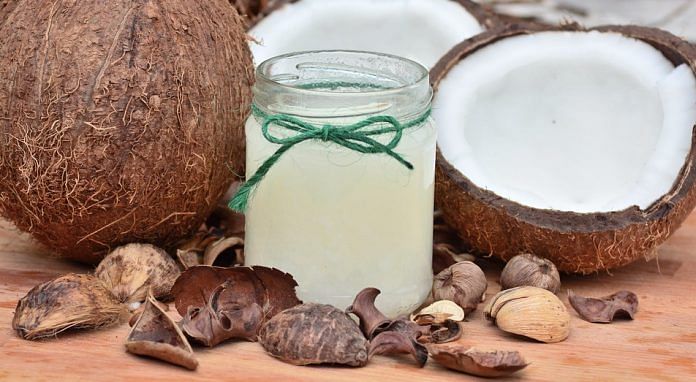Karin Michels says coconut oil ranks among the top worst foods one can eat, but studies in the West make a compelling case for the oil as a ‘superfood’.
Bengaluru: Coconut oil, one of India’s most staple commodities, is “pure poison”, a Harvard professor has claimed.
Dr Karin Michels, professor at the Harvard TH Chan School of Public Health, and director of the Institute for Prevention and Tumour Epidemiology at the University of Freiburg, made the claim last month during a German-language speech titled Coconut Oil and other Nutritional Errors.
https://www.youtube.com/watch?v=Mnc_aoN7lMM&feature=youtu.be
In the speech, Michels reportedly said coconut oil ranks among the top worst foods one can eat, adding that the high number of saturated fatty acids in the oil make it bad for consumption.
Also read: The bajra that can fight India’s iron deficiency problem
Coconut oil has evolved in the public consciousness over the past few years, with new studies alternating between its miraculous benefits and harmful effects on the body. In India, coconut oil has been consumed in its various forms for centuries: It’s used for cooking as well as for topical application over body and hair. In the West, newer scientific studies seem to offer a compelling case for calling coconut oil a ‘superfood’.
It can purportedly contribute to fat loss, kill pathogens, help treat epilepsy, help hair and skin, raise good cholesterol level, increase brain function, and more. Further, several critics are quick to point out that coconut oil isn’t as high in saturated acids as made out to be.
Saturated acids
Consumption of saturated acids and its effects on the human body itself is a matter of much debate. The notion that fatty saturated acid deteriorates cardiovascular health came from a study by an American physiologist Ancel Keys in the 1950s.
Keys showed in his study that increased consumption of saturated fats leads to a higher incidence of heart disease. He further continued his ideas and published a famous study now called the ‘Seven Countries Study’ in which he concluded that countries that ate more unsaturated fats were healthier than those that ate saturated fats. This became known as the Mediterranean Diet and Keys spent his lifetime campaigning for it.
However, many scientists — both Keys’ contemporaries as well as subsequent generations — have been critical of his work, saying that he failed to include other factors such as lifestyle and overall diet into the study. The Seven Countries Diet was especially criticised for selective data use and unscientific conclusions against fatty acids. Keys then joined American Heart Association, and the organisation became the first one to recommend reduction in saturated fats.
Keys also actively panned studies that showed that consumption of sugar was bad for the body and was vocal with his low-fat, high-carb theories right at the time the US saw a sharp rise in obesity and coronary heart disease levels.
Also read: The secret ingredient to Patanjali’s meteoric success: The Indian millennials
Today, scientists have demonstrated through several successful studies that there is no real link between consumption of saturated fats and heart disease. Conversely, more and more evidence is emerging that it is carbohydrates and sugar that contribute to it.
There isn’t a consensus among science and nutrition communities yet as both facts and opinions change rapidly in the face of new evidence.
So for now, don’t take Michels’ word for it and change your coconut oil habits if your morning bulletproof coffee is working for you!



